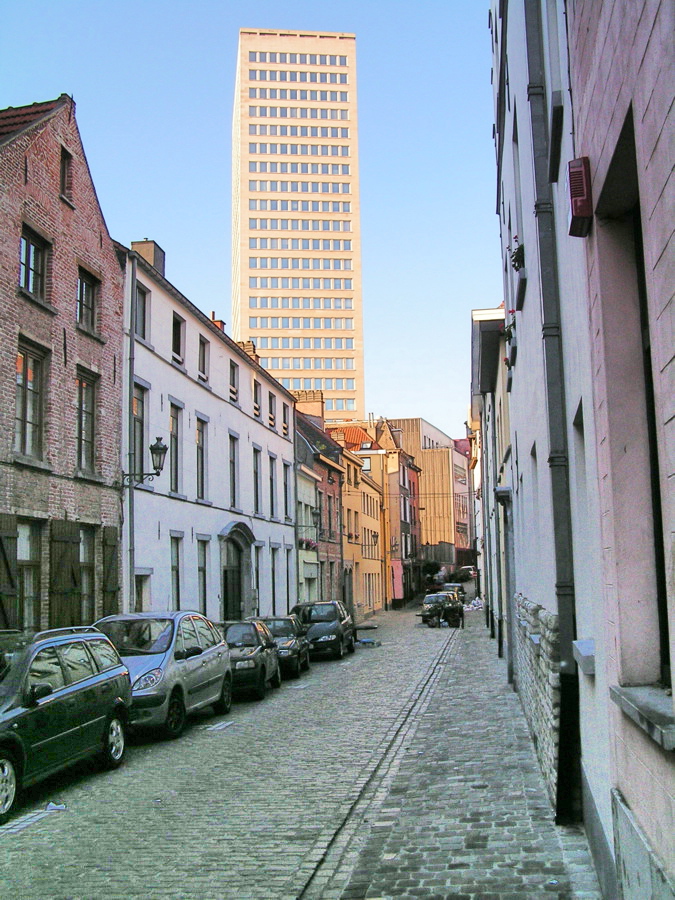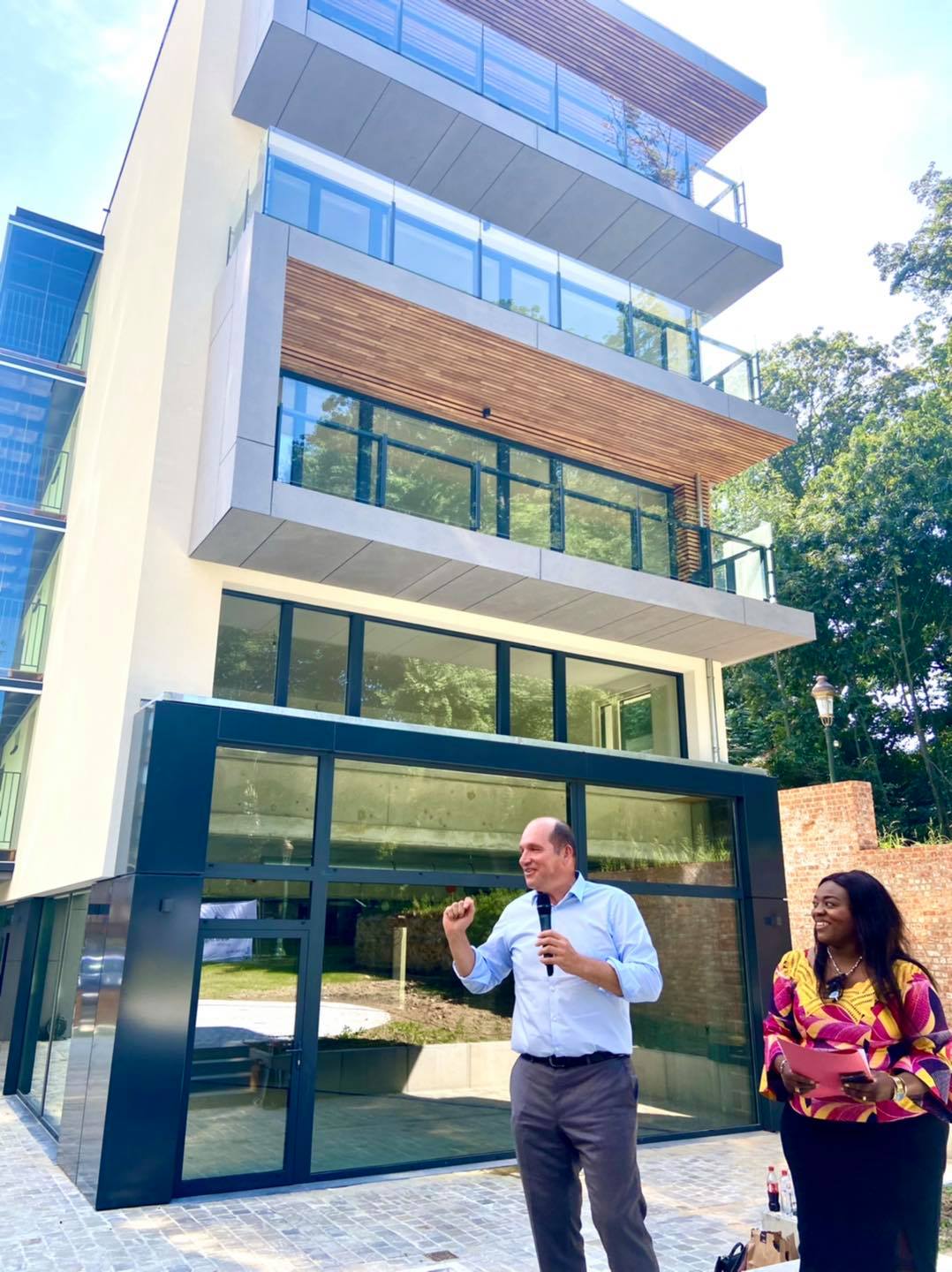Thessaloniki gets ready for its metro launch in November
The underground rapid transit lines have been under construction for almost two decades due to various project delays
 TheMayor.EU logo
TheMayor.EU logo According to the mayor, the new building represents a countermeasure to Brusselisation in the European Quarter
Yesterday, the mayor of Brussels Philippe Close and the Alderwoman of Housing, Public Patrimony and Equal Opportunities Lydia Mutyebele Ngoi inaugurated a new building in Leopold Park in the famous European Quarter. Mayor Close praised the project for bringing the city one step away from Brusselisation and towards more sustainable mixed-use neighbourhoods.
The new building, however, was met with public criticism, sparked by the lack of social housing in the Belgian Capital. The city financed the project, with eight apartments and commercial space on the ground floor on avenue du Maelbeek 21. Regrettably, the Régie foncière (Land Administration) a for-profit public housing company will manage the estate and deal with rent, set to market prices.
Architects protesting the deregulated urban redevelopment scheme of Brussels in the mid-20th century coined the term Brusselisation. In essence, it refers to the haphazard introduction of modern high-rise buildings into gentrified neighbourhoods, especially when they have a pronounced residential character and historic buildings.
In general, the term refers to a quick laissez-faire approach to city planning that focuses on big commercial projects and disregards things like historic character.
 An image of Brusselisation in the Belgian Capital, with a skyscraper standing on the site of
An image of Brusselisation in the Belgian Capital, with a skyscraper standing on the site of
Victor Horta's Art Nouveau Maison du Peuple,
Source: Roby~commonswiki on Wikipedia, CC BY-SA 2.5
Nowhere is this careless attitude towards the urban environment more visible than in the European Quarter in Brussels. Though much of the changes occurred because the city became the NATO and EU capital in 1959, a lot of the decisions for the location, proximity, size and architecture of the buildings have faced scrutiny over the years.
The steel-glass silhouette of the European capitol buildings, the EU Commission building, the EU Parliament building and all adjacent institutions, tower over a modest low-rise commercial-residential area, packed between three parks – Leopold Park, Cinquantenaire Park and Brussels Park. Another prominent feature of the area is the spread of high-rise apartment buildings, that have little architectural stylistic commonalities with both EU buildings and local pre-World War II residential buildings.
Some critics of the newly inaugurated building have pointed out a couple of glaring flaws, mainly – this is a public housing building, not social housing and the building is in Leopold Park, further contributing to the sealing of soil in the city and the gradual reduction of green spaces.
The problem with housing in Brussels is quite pronounced. According to The Equal Times, in September 2020, right at the start of the second wave of Covid infections, 49,000 people were evicted in the city.
Though local authorities put an eviction moratorium in place for much of last year and have extended its period several times, it did not prevent all evictions. Some of the 49,000 people, for instance, were evicted from social housing local authorities scheduled for demolition.
The Régie foncière, on the other hand, does not deal in social housing at all. Instead, as an agency, they manage city-owned property and they lease it at market prices. Some of their offers include 12 square meter dwellings going for 60 euros per month on the edges of the city, in highly industrialized neighbourhoods, and some include spacious luxurious apartments in the heart of Brussels going up to around 1,500 euros.
The reason for public criticism towards the newly inaugurated building lies in the fact that it has been constructed with public money, amid a housing and eviction epidemic and is for-profit, while the city desperately needs more social housing.
 Mayor Philippe Close and Alderwoman Lydia Mutyebele Ngoi in front of the new building,
Mayor Philippe Close and Alderwoman Lydia Mutyebele Ngoi in front of the new building,
Source: Philippe Close on Facebook
Nevertheless, Mayor Close wrote on Facebook about the ecological benefits of the avenue du Maelbeek 21 apartments, explaining that a photovoltaic system and a water filtration system will allow tenants to greatly reduce their carbon footprint.
He continued by emphasising the affordability of the new apartments and their potential to be a tool for the reinvigoration of the European Quarter. At this time, Régie foncière database does not have the apartments listed for rent, so it is hard to determine whether or not they will actually be affordable.

The underground rapid transit lines have been under construction for almost two decades due to various project delays

Now you can get your wine in Talence by paying directly in Bitcoin

That’s because the state has to spend money on updating the railway infrastructure rather than subsidizing the cost of the popular pass

Rethinking renewable energy sources for the urban landscape

The examples, compiled by Beyond Fossil Fuels, can inform and inspire communities and entrepreneurs that still feel trepidation at the prospect of energy transition

Now you can get your wine in Talence by paying directly in Bitcoin

The 10th European Conference on Sustainable Cities and Towns (ESCT) sets the stage for stronger cooperation between the EU, national and local level to fast track Europe's transition to climate neutrality.

At least, that’s the promise made by the mayor of Paris, Anne Hidalgo

The underground rapid transit lines have been under construction for almost two decades due to various project delays

At least, that’s the promise made by the mayor of Paris, Anne Hidalgo

Hostal de Pinós is located in the geographical centre of the autonomous region

Despite its church-y name, the district has long been known as the hangout spot for the artsy crowds

Urban dwellers across the EU are having a say in making their surroundings friendlier to people and the environment.

Forests in the EU can help green the European construction industry and bolster a continent-wide push for architectural improvements.

Apply by 10 November and do your part for the transformation of European public spaces

An interview with the Mayor of a Polish city that seeks to reinvent itself

An interview with the newly elected ICLEI President and Mayor of Malmö

A conversation with the Mayor of Lisbon about the spirit and dimensions of innovation present in the Portuguese capital














